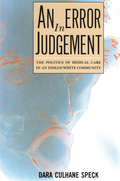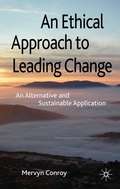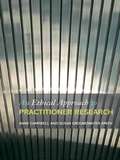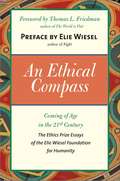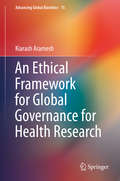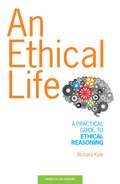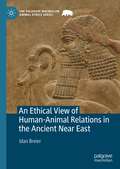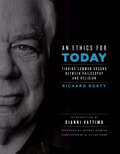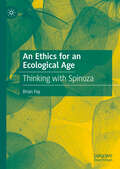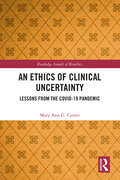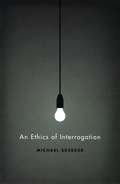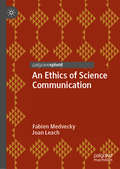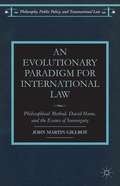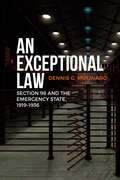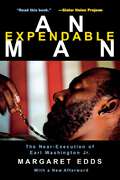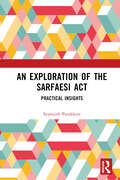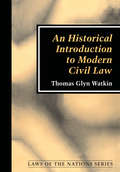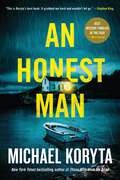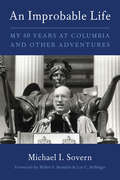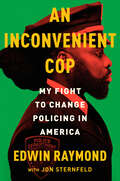- Table View
- List View
An Error in Judgement: The Politics of Medical Care in an Indian/White Community
by Dara Culhane SpeckON JANUARY 22, 1979, an eleven-year-old Native girl died of a ruptured appendix in an Alert Bay, B.C. hospital. The events that followed are chronicled here by Dara Culhane Speck, a member by marriage of the Nimpkish Indian Band in Alert Bay. She has relied mainly on interviews, anecdotes, and public records to describe how this small, isolated Native community took on the local hospital, the College of Physicians and Surgeons, provincial and federal ministries of health, and national media, because their private tragedy held implications that reached far beyond one child, one physician, one town, and even one century.
An Ethical Approach to Leading Change
by Mervyn ConroyMacIntyre's narrative based virtue ethics have for the first time in this book been applied to an organization undergoing change driven by market forces and a society that wants more for less with scant regard for the means by which that is achieved. The practical potential of these insights is explored in the case study that runs through the book.
An Ethical Approach to Practitioner Research: Dealing with Issues and Dilemmas in Action Research
by Anne Campbell Susan Groundwater-SmithPractice based research is burgeoning in a number of professional areas. An Ethical Approach to Practitioner Research covers a comprehensive range of issues and dilemmas encountered in practitioner and action research contexts. While principally focused upon practitioner inquiry in education it takes account of, and acknowledges that others engaged in professional practice such as in legal, nursing and social care contexts, face similar issues and dilemmas. It aims to stimulate ethical thinking and practice in enquiry and research contexts. Following moves to promote professional learning and development in the workplace, there is an increase in the number of practitioners engaging in action or inquiry based learning in the workplace supported by university staff or consultants, as evidenced in the emergence of professional learning communities and learning networks. There are many tensions inherent in relationships between practitioners and academics in terms of the setting of the research agenda, the policy implications that may flow from it and the right to publish outcomes. Negotiating that relationship requires ethical probity where each party recognises, understands and respects mutual responsibilities. The book explores this through a wide variety of roles from those of academic researchers, consultants and teachers to professional practitioners as researchers and, importantly, students and children. It therefore illustrates a number of differing perspectives about ethics and research which are allied to those roles Drawing on the expertise of international researchers and academics from America, Australia and Europe, the book provides invaluable support to the novice researcher and illuminates some of the more intricate issues for the more experienced research practitioner.Packed with detailed and thought-provoking examples this book contains both theoretical analyses of ethical matters and offers practical advice to practitioner and action researchers across the fields of schools hospitals and community and family settings.
An Ethical Compass: The Ethics Prize Essays of the Elie Wiesel Foundation for Humanity
by Thomas L. FriedmanIn 1986, Elie Wiesel received the Nobel Peace Prize in recognition of his victory over “the powers of death and degradation, and to support the struggle of good against evil in the world.” Soon after, he and his wife, Marion, created the Elie Wiesel Foundation for Humanity. A project at the heart of the Foundation’s mission is its Ethics Prize—a remarkable essay-writing contest through which thousands of students from colleges across the country are encouraged to confront ethical issues of personal significance. The Ethics Prize has grown exponentially over the past twenty years. “Of all the projects our Foundation has been involved in, none has been more exciting than this opportunity to inspire young students to examine the ethical aspect of what they have learned in their personal lives and from their teachers in the classroom,” writes Elie Wiesel. Readers will find essays on Bosnia, the genocide in Rwanda, sweatshops and globalization, and the political obligations of the mothers of Argentina’s Disappeared. Other essays tell of a white student who joins a black gospel choir, a young woman who learns to share in Ladakh, and the outsize implications of reporting on something as small as a cracked windshield. Readers will be fascinated by the ways in which essays on conflict, conscience, memory, illness (Rachel Maddow’s essay on AIDS appears), and God overlap and resonate with one another. These essays reflect those who are “sensitive to the sufferings and defects that confront a society yearning for guidance and eager to hear ethical voices,” writes Elie Wiesel. “And they are a beacon for what our schools must realize as an essential component of a true education.”
An Ethical Critique of Fur Factory Farming (The Palgrave Macmillan Animal Ethics Series)
by Andrew Linzey Clair LinzeyThe fur trade is a multi-million-dollar industry. It is estimated that over 100 million animals are killed in fur farms worldwide annually. This book provides an in-depth analysis of the state of fur factory farming worldwide, and an ethical critique of the main arguments propounded by the fur industry. Consideration is also given to an attempt to justify fur farming through the concept of “Welfur." Andrew Linzey and Clair Linzey argue that from any ethical perspective, fur factory farming fails basic moral tests.
An Ethical Framework for Global Governance for Health Research (Advancing Global Bioethics #15)
by Kiarash ArameshThis book provides a comprehensive description and ethical analysis of one of the most challenging areas: international health research. Furthermore, it provides a vivid portrait of the current situation of global governance for health research and its main challenges and suggests a comprehensive and universal ethical framework based on the existing theories and frameworks. This work is a must-read for all the students, scholars, professionals, activists, and policy-makers who are involved or interested in the global health research enterprise and its governance and ethics.
An Ethical Life: A Practical Guide to Ethical Reasoning
by Richard KyteEthics isn't just a set of principles to study, but a skill to practice. By introducing a logical 4-Way Method, An Ethical Life demonstrates how everyone has the capability to work out complex and real ethical dilemmas.
An Ethical View of Human-Animal Relations in the Ancient Near East (The Palgrave Macmillan Animal Ethics Series)
by Idan BreierExploring the earliest literary evidence for human-animal relations, this volume presents and analyzes biblical and Mesopotamian (Sumerian, Assyrian, and Babylonian) sources from the third millennium BCE through to the consolidation of the biblical literature in the first millennium BCE. Key Features:Provides the first comprehensive study of these texts from an ethical perspective.Examines proverbs, popular aphorisms, myths, epic literature, wisdom literature, historiography, prophecy, and law codes.Applies methodology from current contemporary biblical and ancient Near Eastern scholarship and human-animal ethics, thereby raising new questions that lead to fresh insights.An Ethical View of Human Animal-Relations in the Ancient Near East is essential reading for scholars and graduate students of animal ethics, applied ethics and biblical studies.
An Ethics for Today: Finding Common Ground Between Philosophy and Religion
by Richard RortyRichard Rorty is famous, maybe even infamous, for his philosophical nonchalance. His groundbreaking work not only rejects all theories of truth but also dismisses modern epistemology and its preoccupation with knowledge and representation. At the same time, the celebrated pragmatist believed there could be no universally valid answers to moral questions, which led him to a complex view of religion rarely expressed in his writings.In this posthumous publication, Rorty, a strict secularist, finds in the pragmatic thought of John Dewey, John Stuart Mill, William James, and George Santayana, among others, a political imagination shared by religious traditions. His intent is not to promote belief over nonbelief or to blur the distinction between religious and public domains. Rorty seeks only to locate patterns of similarity and difference so an ethics of decency and a politics of solidarity can rise. He particularly responds to Pope Benedict XVI and his campaign against the relativist vision. Whether holding theologians, metaphysicians, or political ideologues to account, Rorty remains steadfast in his opposition to absolute uniformity and its exploitation of political strength.
An Ethics for Today: Finding Common Ground Between Philosophy and Religion
by Richard RortyOne of the most widely discussed philosophers of the 21st century finds common ground between spiritual and secular ethics in this provocative book.As controversial and he was influential, Richard Rorty developed a brand of philosophical pragmatism that rejects all theories of truth. His groundbreaking work also dismisses modern epistemology and its preoccupation with knowledge and representation. Though he was a strict secularist, Rorty believed there could be no universally valid answers to moral questions. This led him to a surprisingly complex view of religion rarely expressed in his writings. In this posthumous publication, Rorty finds in the pragmatic thought of John Dewey, John Stuart Mill, William James, and George Santayana, among others, a political imagination shared by religious traditions. Rather than promote belief or nonbelief, Rorty seeks to locate patterns of similarity and difference so an ethics of decency and a politics of solidarity can rise. He particularly responds to Pope Benedict XVI and his campaign against the relativist vision. Whether holding theologians, metaphysicians, or political ideologues to account, Rorty remains steadfast in his opposition to absolute uniformity and its exploitation of political strength.
An Ethics for an Ecological Age: Thinking with Spinoza
by Brian FayThis book presents a comprehensive vision of human life, ecology, and theology inspired by Spinoza. According to this vision, human beings and all other natural entities are not independent substances but are rather “modes” of nature, meaning that they are fleeting manifestations of nature’s conatus. By intuitively (and not just intellectually) recognizing ourselves to be modes of nature, we can more fully realize ourselves. To achieve this requires a radical rethinking of our world, of ourselves, and of God, and a far richer understanding of ecology, and an ethics grounded in ecology, than those in current usage. Brian Fay explores this rethinking, and the result is a new, far-reaching vision of our world and how to be responsible, thriving agents in it.
An Ethics of Clinical Uncertainty: Lessons from the COVID-19 Pandemic (ISSN)
by Mary Ann CutterThis book explores the ethical implications of managing uncertainty in clinical decision-making during the COVID-19 pandemic. It develops an ethics of clinical uncertainty that brings together insights from the clinical and biomedical ethical literatures.The book sets out to recognize the central role uncertainty plays in clinical decision-making and to acknowledge the different levels, kinds, and dimensions of clinical uncertainty. It also aims to aid clinicians and patients in managing clinical uncertainty and to recognize the ethical duty they have to manage clinical uncertainty. The book addresses four ethical duties related to clinical uncertainty: (1) to advance the welfare of those in clinical medicine, (2) to respect the rights of those in clinical medicine, (3) to promote just access to health care, and (4) to care for one another in clinical medicine. These duties took on select urgency during the COVID-19 pandemic because clinical risk assessments about COVID-19 were limited, we were asked to give informed consent in the context of limited and changing knowledge, the pandemic unearthed myriad problems about the distribution of health care, and the pandemic raised questions about how we care for each other in medicine.An Ethics of Clinical Uncertainty will appeal to scholars, advanced students, and medical professionals working in philosophy of medicine, biomedical ethics, clinical medicine, nursing, public health care, and gerontology.
An Ethics of Interrogation
by Michael SkerkerThe act of interrogation, and the debate over its use, pervades our culture, whether through fictionalized depictions in movies and television or discussions of real-life interrogations on the news. But despite daily mentions of the practice in the media, there is a lack of informed commentary on its moral implications. Moving beyond the narrow focus on torture that has characterized most work on the subject, An Ethics of Interrogation is the first book to fully address this complex issue. In this important new examination of a controversial subject, Michael Skerker confronts a host of philosophical and legal issues, from the right to privacy and the privilege against compelled self-incrimination to prisoner rights and the legal consequences of different modes of interrogation for both domestic criminal and foreign terror suspects. These topics raise serious questions about the morality of keeping secrets as well as the rights of suspected terrorists and insurgents. Thoughtful consideration of these subjects leads Skerker to specific policy recommendations for law enforcement, military, and intelligence professionals.
An Ethics of Interrogation
by Michael SkerkerThe act of interrogation, and the debate over its use, pervades our culture, whether through fictionalized depictions in movies and television or discussions of real-life interrogations on the news. But despite daily mentions of the practice in the media, there is a lack of informed commentary on its moral implications. Moving beyond the narrow focus on torture that has characterized most work on the subject, An Ethics of Interrogation is the first book to fully address this complex issue.In this important new examination of a controversial subject, Michael Skerker confronts a host of philosophical and legal issues, from the right to privacy and the privilege against compelled self-incrimination to prisoner rights and the legal consequences of different modes of interrogation for both domestic criminal and foreign terror suspects. These topics raise serious questions about the morality of keeping secrets as well as the rights of suspected terrorists and insurgents. Thoughtful consideration of these subjects leads Skerker to specific policy recommendations for law enforcement, military, and intelligence professionals.
An Ethics of Science Communication
by Fabien Medvecky Joan LeachThis book presents the first comprehensive set of principles for an ethics of science communication. We all want to communicate science ethically, but how do we do so? What does being ethical when communicating science even mean? The authors argue that ethical reasoning is essential training for science communicators. The book provides an overview of the relationship between values, science, and communication. Ethical problems are examined to consider how to create an ethics of science communication. These issues range from the timing of communication, narratives, accuracy and persuasion, to funding and the client-public tension. The book offers a tailor-made ethics of science communication based on principlism. Case studies are used to demonstrate how this tailor-made ethics can be applied in practice.
An Evolutionary Paradigm For International Law
by John Martin GillroyThe book transcends conventional social scientific method, political theory and its understanding of global governance to make the study of the philosophical essence of the international legal system fully accessible.
An Exceptional Law: Section 98 and the Emergency State, 1919-1936
by Dennis G. MolinaroDuring periods of intense conflict, either at home or abroad, governments enact emergency powers in order to exercise greater control over the society that they govern. The expectation though is that once the conflict is over, these emergency powers will be lifted. An Exceptional Law showcases how the emergency law used to repress labour activism during the First World War became normalized with the creation of Section 98 of the Criminal Code, following the Winnipeg General Strike. Dennis G. Molinaro argues that the institutionalization of emergency law became intricately tied to constructing a national identity. Following a mass deportation campaign in the 1930s, Section 98 was repealed in 1936 and contributed to the formation of Canada’s first civil rights movement. Portions of it were used during the October Crisis and recently in the Anti-Terrorism Act of 2015. Building on the theoretical framework of Agamben, Molinaro advances our understanding of security as ideology and reveals the intricate and codependent relationship between state-formation, the construction of liberal society, and exclusionary practices.
An Expendable Man: The Near-Execution of Earl Washington, Jr.
by Margaret EddsHow is it possible for an innocent man to come within nine days of execution? An Expendable Man answers that question through detailed analysis of the case of Earl Washington Jr., a mentally retarded, black farm hand who was convicted of the 1983 rape and murder of a 19-year-old mother of three in Culpeper, Virginia. He spent almost 18 years in Virginia prisons—9 1/2 of them on death row—for a murder he did not commit.This book reveals the relative ease with which individuals who live at society's margins can be wrongfully convicted, and the extraordinary difficulty of correcting such a wrong once it occurs.Washington was eventually freed in February 2001 not because of the legal and judicial systems, but in spite of them. While DNA testing was central to his eventual pardon, such tests would never have occurred without an unusually talented and committed legal team and without a series of incidents that are best described as pure luck.Margaret Edds makes the chilling argument that some other “expendable men” almost certainly have been less fortunate than Washington. This, she writes, is “the secret, shameful underbelly” of America's retention of capital punishment. Such wrongful executions may not happen often, but anyone who doubts that innocent people have been executed in the United States should remember the remarkable series of events necessary to save Earl Washington Jr. from such a fate.
An Exploration of the SARFAESI Act: Practical Insights
by Syamjith ParakkottThis book looks at the constitutional and regulatory frameworks of loan and debt recovery laws and legislations. It explores different aspects of the Securitisation and Reconstruction of Financial Assets and Enforcement of Security Interest (SARFAESI) Act, 2002, along with the issues and challenges in enforcing the Act in India.The book explores the evolution of debt recovery laws in India by analysing various past cases and legislations relating to the recovery of dues by banks and financial institutions. Taking the rights of both banks and borrowers into consideration, it provides a description of the relevant provisions of the SARFAESI Act and its implications. The author analyses relevant case laws and practical experiences to highlight the positives and the issues of the SARFAESI Act that have strengthened the creditor’s rights in India. The book also looks at the consolidation of insolvency and bankruptcy laws in India that have contributed to the process of debt recovery while protecting customers.Lucid and comprehensive, this volume will be an indispensable resource for students and researchers of law, business and company law, monetary economics, macroeconomics, Asian law, and comparative law. It will also be useful for teaching faculty, legal practioners and bankers.
An Historical Introduction to Modern Civil Law (Laws of the Nations Series #3)
by Thomas Glyn WatkinThe civil law systems of continental Europe, Latin America and other parts of the world, including Japan, share a common legal heritage derived from Roman law. However, it is an inheritance which has been modified and adapted over the centuries as a result of contact with Germanic legal concepts, the work of jurists in the mediaeval universities, the growth of the canon law of the western Church, the humanist scholarship of the Renaissance and the rationalism of the natural lawyers of the seventeenth and eighteenth centuries. This volume provides a critical appreciation of modern civilian systems by examining current rules and structures in the context of their 2,500 year development. It is not a narrative history of civil law, but an historical examination of the forces and influences which have shaped the form and the content of modern codes, as well as the legislative and judicial processes by which they are created are administered.
An Honest Man: A Novel
by Michael KorytaIn this breathtaking thriller from the New York Times bestselling author of Those Who Wish Me Dead, the murder of several politicians at sea shatters the world of a local lobsterman who must prove his innocence and save his own life.Israel Pike was a killer, and he was an honest man. They were not mutually exclusive. After discovering seven men murdered aboard their yacht – including two Senate rivals – Israel Pike is regarded as a prime suspect. A troubled man infamous on Salvation Point Island for killing his own father a decade before, Israel has few options, no friends, and a life-threatening secret. Elsewhere on the island, 12-year-old Lyman Rankin seeks shelter from his alcoholic father in an abandoned house only to discover that he is not alone. A mysterious woman greets him with a hatchet and a promise: &“Make a sound and I&’ll kill you.&” As the investigation barrels forward, Lyman, Israel, and the fate of the case collide in immutable ways. Written with mounting suspense, stirring emotion, and deep understanding of character, Koryta continues to prove why David Baldacci has called him &“an exceptionally gifted storyteller&” and Michael Connelly has deemed him &“one of the best of the best, plain and simple.&”
An Improbable Life
by Walter F. Mondale Lee C Bollinger Michael I. SovernColumbia University began the second half of the twentieth century in decline, bottoming out with the student riots of 1968. Yet by the close of the century, the institution had regained its stature as one of the greatest universities in the world.According to the New York Times, "If any one person is responsible for Columbia's recovery, it is surely Michael Sovern." In this memoir, Sovern, who served as the university's president from 1980 to 1993, recounts his sixty-year involvement with the institution, as well as his experiences growing up poor in the South Bronx and attending Columbia. Sovern addresses key debates in academia, such as how to make college available to all, whether affirmative action is fair, whether great researchers are paid too much and valuable teachers too little, what are the strengths and weaknesses of lifetime tenure, and what is the government's responsibility for funding universities. A labor-law specialist, Sovern also discusses his personal and professional accomplishments off campus, particularly his work to compensate victims of racial exploitation and his recommendations as chairman of the Commission on Integrity in Government.
An Improbable Life: My Sixty Years at Columbia and Other Adventures
by Michael I. SovernColumbia University began the second half of the twentieth century in decline, bottoming out with the student riots of 1968. Yet by the close of the century, the institution had regained its stature as one of the greatest universities in the world.According to the New York Times, "If any one person is responsible for Columbia's recovery, it is surely Michael Sovern." In this memoir, Sovern, who served as the university's president from 1980 to 1993, recounts his sixty-year involvement with the institution after growing up in the South Bronx. He addresses key issues in academia, such as affordability, affirmative action, the relative rewards of teaching and research, lifetime tenure, and the role of government funding. Sovern also reports on his many off-campus adventures, including helping the victims of the Tuskegee syphilis experiment, stepping into the chairmanship of Sotheby's, responding to a strike by New York City's firemen, a police riot and threats to shut down the city's transit system, playing a role in the theater world as president of the Shubert Foundation, and chairing the Commission on Integrity in Government.
An Inconvenient Cop: My Fight to Change Policing in America
by Jon Sternfeld Edwin Raymond&“With illuminating, vivid, and meticulous prose, Edwin Raymond delivers an extraordinary exposé on policing in America . . . An essential, exceptional work.&” —Toluse Olorunnipa, Pulitzer Prize–winning author of His Name Is George FloydFrom the highest-ranking whistleblower in NYPD history, a gripping insider look at the complexities of modern policing and the urgent need for reformOver his decade and a half with the New York Police Department, Edwin Raymond consistently exposed the dark underbelly of modern policing, becoming the highest-ranking whistleblower in the history of the force and one of the country&’s leading voices against police injustice. Offering a rare, often shocking view of American policing, An Inconvenient Cop pulls back the curtain on the many flaws woven into the NYPD&’s training, data, and practices, which have since been repackaged and repurposed by police departments across the country.Gravitating toward law enforcement in the hope of being a positive influence in his community, Raymond quickly learned that the problem with policing is a lot deeper than merely &“a few bad apples&”—the entire mechanism is set up to ensure that racial profiling is rewarded, and there are weighty consequences for cops who don&’t play along. Struggling with the moral dilemma of policing impartially while witnessing his fellow officers go with the flow, Raymond&’s journey takes him to the precipice of personal and professional ruin. Yet, through it all, he remains steadfast in his commitment to justice and his belief in the potential for change.At once revelatory and galvanizing, An Inconvenient Cop courageously bears witness to and exposes institutional violence. It presents a vision of radical hope and makes the case for a world in which the police&’s responsibility is not to arrest numbers but to the people.
